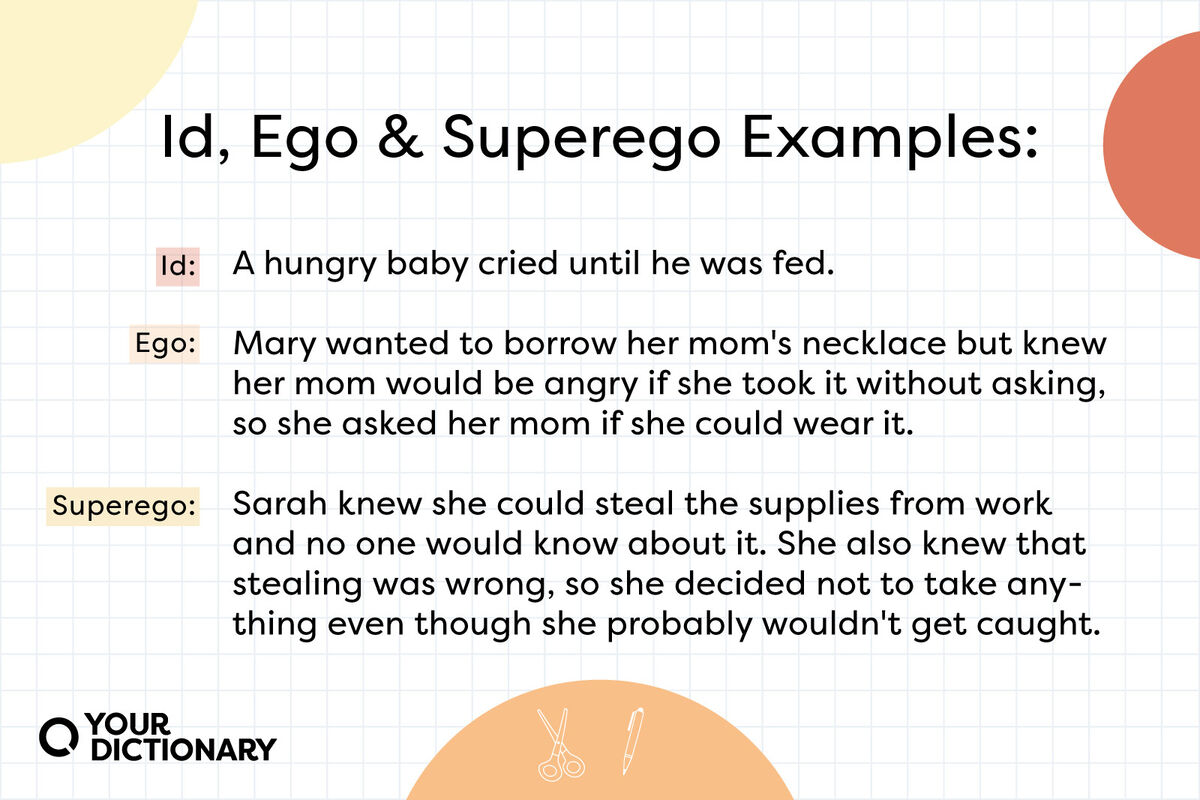
The id, ego, and superego are names for the three parts of the human personality which are part of Sigmund Freud's psychoanalytic personality theory. According to Freud, these three parts combine to create the complex behavior of human beings. Let's look at several examples of id, ego, and superego.
Id: Meeting Basic Needs
The id is the most basic part of the personality. It also represents our most animalistic urges, like the desire for food and sex. The id seeks instant gratification for our wants and needs. If these needs or wants are not met, a person can become tense, anxious, or angry.
- Sally was thirsty. Rather than waiting for the server to refill her glass of water, she reached across the table and drank from Mr. Smith's water glass, much to his surprise.
- A hungry baby cried until he was fed.
- A toddler who wanted another helping of dessert whined incessantly until she was given another serving.
- In line at the salad bar, Amy was so hungry that she shoved a handful of croutons in her mouth as she waited for the line to move.
- Bart was stuck in traffic. He just wanted his vehicle to move! Enraged at the situation, Bart pulled his car onto the shoulder and sped forward, not caring that he was clipping people's side mirrors as he tried to get ahead of the cars in front of him.
Ego: Dealing With Reality
The ego deals with reality, trying to meet the desires of the id in a way that is socially acceptable in the world. This may mean delaying gratification and helping to get rid of the tension the id feels if a desire is not met right away. The ego recognizes that other people have needs and wants too, and being selfish isn't good in the long run.
- Sally was thirsty. However, she knew that her server would be back soon to refill her water glass, so she waited until then to get a drink, even though she really just wanted to drink from Mr. Smith's glass.
- In line at the salad bar, Amy really wanted to shove a handful of croutons into her mouth. However, since her boss was there, she decided to wait another minute or two until she sat down to eat.
- Mary really wanted to borrow her mom's necklace, but knew her mom would be angry if she took it without asking, so she asked her mom if she could wear it.
- Hillary was so sweaty after her workout that she wanted to change her clothes right there by the car. However, she knew the other people around her would not approve, so she waited until she was in the restroom to change.
- Tim really wanted to slug Mark for what he had just said. However, Tim knew if he hit Mark, he would be kicked off the baseball team, and since he loved baseball, he unclenched his fists and walked away.
Superego: Adding Morals
The superego develops last, and is based on morals and judgments about right and wrong. Even though the superego and the ego may reach the same decision about something, the superego's reason for that decision is based more on moral values, while the ego's decision is based more on what others will think or what the consequences of an action could be on the individual.
- Sarah knew she could steal the supplies from work and no one would know about it. However, she knew that stealing was wrong, so she decided not to take anything even though she would probably never get caught.
- Maggie couldn't remember the answer to test question #12, even though she had studied. Nate was the smartest kid in the class, and from where Maggie sat, she could see his answers if she turned her head slightly. When Mrs. Archer turned her back, Maggie almost cheated, but her conscience stopped her because she knew it was wrong. Instead, Maggie took a guess at the answer and then turned in her paper.
- The cashier only charged the couple for one meal even though they had eaten two. They could have gotten away with only paying for one, but they pointed out the cashier's mistake and offered to pay for both meals. They wanted to be honest and they knew that the restaurant owner and employees needed to make a living.
- On the playground, two kids were making fun of Joseph because he wore glasses. John was tempted to join in so that he could make himself look good, but when he thought about how bad Joseph must already feel, he knew that he couldn't.
- Will had worked hard all season to break the school record in cross-country. During his last race, he had the opportunity to cut a corner and therefore lower his time, because no officials were watching that part of the course. As much as he wanted to break the school record, Will knew he wouldn't feel good about himself if he cheated, so he stuck to the course and ran as fast as he could.
Id, Ego, and Superego
The id, ego and superego work together to create human behavior. The id creates the demands, the ego adds the needs of reality, and the superego adds morality to the action which is taken.
Even though each of these elements make up human behavior, they also constitute some of our favorite characters in the books we read. Take a look at this list of character trait examples to see what you'd like to incorporate in your next short story or novel.